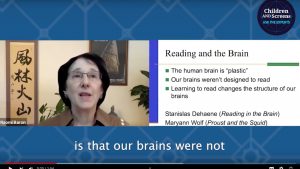
Naomi Baron, PhD (Professor Emerita of Linguistics, American University), discusses the effects of screen time on brain development related to acquisition of language and literacy at #AskTheExperts webinar “Minds on Media: The Associations between Screen Engagement and Children’s Developing Brains” on November 3, 2021.
[Dr. Naomi Baron] So let’s think about reading in particular and your brain. But first, focusing on the brain. We know that the human brain is what’s known as “plastic.” That is, it can change over time. It’s not just the developing brain and children, it’s also as we get older. But we’re going to focus today on the children issue. A second thing we know is that our brains were not neurologically designed for reading. No surprise, because literacy and writing more generally have only been with us for depending on how you count about 4-5000 years. What happens though is that as people learn to read, and this is each and every one of us, our brain changes. We know the brains of people who are non-literate as adults are different from the brains of people who are literate. So in one study done with preschool kids, Hutton and his colleagues was able to show that children who were exposed to a lot of screen use had lower and I’ll quote, “lower microstructural integrity of the brain white matter tracts,” those are areas of the brain that are necessary for developing language and the skills that become important to literacy. With that same cohort of pre-K kids, Hutton and his colleagues found that if you looked at the environment in the home, that is where there are things that supported the development of literacy, such as access to books and shared reading with kids, when you had less access to books and less shared reading with kids, there was that same lack of development of those tracks in the brain that are useful and necessary for language development.
View the full webinar

Minds on Media: The Associations between Screen Engagement and Children’s Developing Brains
How can we use screens responsibly in order to have a positive impact on children's cognitive abilities both at home and in the classroom?
Martin Paulus, MD
Scientific Director and President, Laureate Institute for Brain Research Adjunct Professor, Department of Psychiatry, University of California, San Diego
Naomi Baron, PhD
Professor Emerita of Linguistics, American University
Jason Chein, PhD
Director, Temple University Brain Research & Imaging Center, Professor, Department of Psychology, Temple Universit
Marc Potenza, MD, PhD
Director, Division on Addictions Research at Yale, Professor of Psychiatry, Neuroscience and Child Study, Yale University School of Medicine


